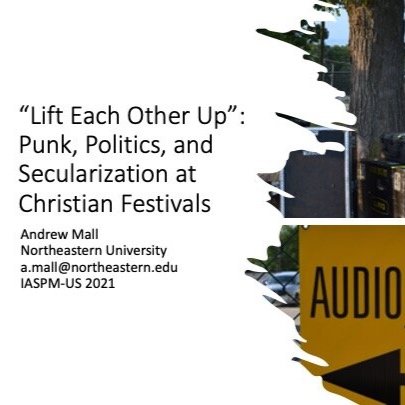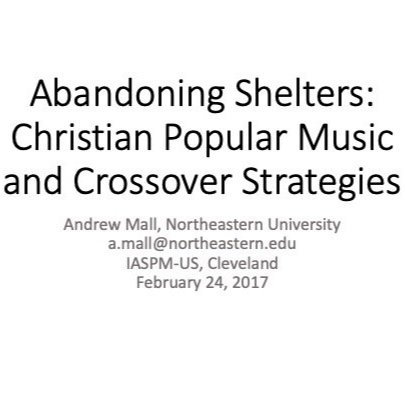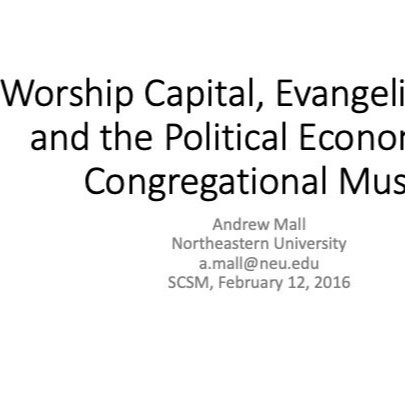
Hardcore Community at Furnace Fest: Nostalgia, Belongingness, and Vulnerability
Punk Scholars Network conference presentation (2025). In this paper I reflect on the meaningfulness of the Furnace Fest community to individual participants. My findings are based on four sequential years of fieldwork at Furnace Fest (2021–24) with ever-growing research teams, hundreds of survey responses, and dozens of hours of semi-structured interviews with organizers, community members, and random attendees (around 50 conducted at the 2024 event alone). I argue that nostalgia at Furnace Fest is generative as much as it is reflective, affirming participants’ identities while also empowering them to take risks and be vulnerably transparent in relative safety.

Hardcore Nostalgia at Furnace Fest
MEIEA conference presentation (2024). What is the nature of hardcore, and how does hardcore nostalgia reflect its values and meet its needs? More than merely a marketing ploy, is hardcore nostalgia also an invitation to revisit and romanticize the anxieties of our youth; an attempt at a do-over; or perhaps even an act of emotional and mental self-care? In this presentation, we trace these trends in hardcore and emo to ask: what do we do with nostalgia that asks us to remember when we were young and angry and sad?

Author Meets Critics: Andrew Mall’s God rock, Inc.
AAR (2023) “author meets critics” panel on God Rock, Inc. Panelists will consider how Christian music as a niche business shapes religious communities in the United States (and beyond), as well as how its many genres and subgenres - pop, rock, metal, rap, hip hop, praise and worship, etc. - reflect and shape evangelical Christian politics, practice, and theology.

Mosh Pit Methods: Team-based Collaborative Fieldwork at a Hardcore Punk Festival
SEM conference presentation (2023). In this paper, we address the complexities of collaborating at these multiple levels: with each other, research assistants, festival organizers and staff, community leaders and members, and festival attendees. In attending to these challenges and opportunities, we open a conversation about the power and potential of team-based, collaborative fieldwork.

Collaborative Ethnography at Furnace Fest: Initial Findings on Affect, Community, and Commerce in Hardcore
Colloquium presentation (2022). At Furnace Fest (Birmingham, Alabama), attendees travel from across the U.S. and Canada for three days of emo, hardcore, metal, and punk performances. Based on ongoing fieldwork, in this talk I consider what my research collaborators and I have learned so far about working together—both in terms of our research methodologies and in terms of festival organizers and their communities.

Furnace Fest Community: A Public Conversation
Public research presentation (2022). Prior to Furnace Fest 2022, I helped organize a public conversation as part of an official pre-fest event. The plan was to present some of our initial research findings and moderate a public conversation with the participation of two of Furnace Fest’s organizers and one of the Furnace Fest Community moderators.

(Post-)Christian Hardcore, Community, and Nostalgia at Furnace Fest
Conference presentation (2022). At Furnace Fest 2021 (Birmingham, Alabama), attendees traveled from across the U.S. and Canada for three days of emo, hardcore, and metal performances. Based on ongoing, collaborative fieldwork in the Furnace Fest community, in this paper I build upon prior work that posits festivals as physical places for imagined communities (Mall 2015; cf. Anderson 1991 [1983]) and scenes (Mall 2020) to consider how music festivals, as sensational forms (Meyer 2009), substantiate musical community itself (see, e.g., Shelemay 2011).

Musicking the Right Way: Performing Ethics and/as Aesthetics at Christian Music Festivals
AMS conference presentation (2021). Cornerstone Festival performed its organizers’ ethics into being, witnessed in its do-it-yourself scrappiness, its (at times) overwhelming sonic chaos, its sanctioned attendee-operated “generator stages,” and its willingness to engage difficult theological questions. From one perspective, this reflects a tautological relationship between orthodoxy and orthopraxy grounded in theology; another perspective reveals the co-constitutiveness of ethics and aesthetics grounded in practice. To recast Jeffers Engelhardt’s “right singing,” at Cornerstone, if the performing was right, then the ethics expressed in that performing were right, and if the ethics were right, then the musical practices grounded in those ethics were right. In this paper, I draw on theories of music and ethics rooted in Christian musicking to generate a theoretical framework that situates these practices not within a shared faith but rather within a shared ethical framework irrespective of religious belief.

Recent Books on Christian Music
Popular Music Books in Process roundtable presentation (2021). Nathan Myrick, Marcell Silva Steuernagel, and myself discussed our recent books in conversation with each other as part of the PMBiP series of author talks, co-sponsored by IASPM-US, JPMS, and the Popcon.

“God told me to give my records away”: Keith Green and the Ethics of Commerce in the 1970s U.S. Christian Music Industry
SAM conference presentation (2021). “God just told me to start my own label and give my records away.” So spoke Christian songwriter Keith Green to Billy Ray Hearn, his record label’s founder and owner, in 1979. Green was convicted that his music could not minister to those who most needed to hear God’s message unless it was freely available. In this paper, I examine Green’s career to illustrate how one artist navigated the delicate balance of ethical and commercial imperatives. I argue that ethical objectives can be just as important as aesthetic or commercial ones, particularly in their ability to establish markets’ boundaries.

“Lift Each Other Up”: Punk, Politics, and Secularization at Christian Festivals
IASPM-US conference presentation (2021). When the members of Flatfoot 56, a Celtic punk band from Chicago, speak of “brotherhood” at AudioFeed, a Christian music festival, they refer to congregational cohesion; at a secular punk venue, however, scene unity is just as likely an interpretation. Whereas Christian punks sacralize secular places, such as the bars and nightclubs where they often perform, this paper suggests that bands like Flatfoot 56 might be thought to secularize sacred places (i.e., Christian festivals) by decentering U.S. evangelicalism’s most controversial public positions. Through an ethnographic analysis of Flatfoot 56 performances, considering what is sung/spoken aloud and what is not, this paper argues for a nuanced, mediating perspective that recognizes an ambivalence about identity politics among many evangelical subculturalists moving between secular and sacred spaces.

Music / Business / Ethics at Christian Festivals
Music Festival Studies conference presentation (2020). In this paper, based on ethnographic fieldwork at Christian music festivals and formal interviews with festival organizers, I address festivals as sites of musical ethics made manifest. By focusing on specific niche Christian music festivals, I am able to emphasize the relationships between the values of their organizers, artists, and attendees and the lived experiences of the events themselves. But my conclusions have implications for the viability of the broader festival industry, particularly small events that cannot afford to compete with the Bonnaroos, Coachellas, and Lollapaloozas.

“Find a Way”: Amy Grant and Christian Pop’s Mainstream Crossover
AMS conference presentation (2019). In this paper I argue that Amy Grant’s success was the cumulative result of longer strategies to cross her over from the relatively small Christian market to the massive general mainstream pop market. Archival research reveals business and artistic decisions that prepared Grant for her first attempt at crossover with the 1985 album Unguarded.

“Beer & Hymns” and Congregational Song: Participatory Sing-alongs as Community
Christian Congregational Music conference presentation (2019). Beer and Hymns is exactly what it sounds like: we raise our red Solo cups and lift our voices together to sing hymns, spirituals, praise songs, and folk songs together. Song choices include both secular and sacred selections, and the nightly gatherings attract participants from a variety of theological backgrounds, many of whom have an ambivalent or troubled relationship with Protestant Christianity (including mainline and non-denominational evangelicalism). Our voices entwine, and often our arms do, too. And by the end of the night, as our singing reverberates in the night, we emerge unified by our singing, even if only for one night.

“Beer & Hymns” and Redemption: Reimagining and Reclaiming Religious Identity through Participatory Sing-alongs
Sound & Secularity symposium presentation (2019). Given the ambivalent (and sometimes antagonistic) relationship between houses of worship and houses of drink in the United States, the mere act of singing hymns in bars can be interpreted as resisting prescriptive religious norms. But in recontextualizing these songs in Wild Goose’s pub tent, beers in hand, participants—including current and former churchgoers—reimagine their theologies and reclaim their religious identities. In this paper, I analyze the sonic and social fabric of Beer and Hymns as a participatory space that enables resilience and redemption.

Selling Out or Buying In? Archival Research of Consumer Discourse about Christian Record Label Consolidation
MEIEA conference presentation (2018). In this paper I consider the role of archival research in music industry studies to address fan discourse as a barometer of anxieties over corporate consolidation. As a result of MEIEA-funded research into CCM magazine (at Middle Tennessee State University’s Center for Popular Music), I discuss methodological approaches for discerning the diverse range of opinions expressed by committed fans (as a kind of historical ethnography and reception study) and present my findings not only in light of their importance to the historical record but also in terms of their practical significance to music and entertainment industry decision-makers considering an acquisition today.

Resistance, Renewal, and Congregation at Christian Music Festivals
AAR conference presentation (2017). Based on interviews with festival staff and attendees, historical research, ethnographic fieldwork at Cornerstone in 2009–2012 (including two summers volunteering as festival staff), and fieldwork at AudioFeed and Wild Goose in 2017, this paper examines the production of space, place, and community at Cornerstone, AudioFeed, and Wild Goose.

Abandoning Shelters: Christian Popular Music and Crossover Strategies
IASPM-US conference presentation (2017). In this paper, I critically analyze the strategies of two crossover cases: Amy Grant, who became the first Christian pop singer with a number-one Billboard Hot 100 single following the 1991 release of “Baby, Baby,” and Tooth and Nail Records, a Christian metal and punk label whose artists straddle multiple margins, crossing over from one to another. In doing so, I build upon the works of Hebdige, Toynbee, Weisbard, and others to theorize crossover as a process through which niche markets change over time.

Worship Capital, Evangelicalism, and the Political Economy of Congregational Music
SCSM conference presentation (2016). Building upon the works of Pierre Bourdieu, analyses of music industries, and contemporary discourses of intellectual property, this paper outlines a theoretical framework for the political economy of worship music and considers barriers to integrating this framework into our scholarship and practice. This research emerges from several years of ethnographic fieldwork at the Anchor Fellowship, a non-denominational evangelical church in Nashville, Tennessee, and advances the concept of “worship capital” to capture the various ways in which individuals and institutions invest in worship.

Music Festivals as Scenes: Producing Ephemeral Space Annually at Cornerstone Festival
SEM conference presentation (2015). Based on interviews with festival staff, historical research, and ethnographic fieldwork in 2009–2012—including time working on the festival’s setup, stagehand, and teardown crews—this paper examines the production of space and place at Cornerstone Festival. In doing so, it contributes a vital link between scene theory and the growing ethnomusicological literature on festivals.
Search and navigate extras
- music industries
- festivals
- gamelan
- Boston
- God Rock Inc
- CCM
- Northeastern University
- Christian rock
- panels
- Tufts University
- worship
- congregational music
- Northeastern Global News
- SCM
- record labels
- Nashville
- methods
- ethics
- Chicago
- University of Chicago
- punk
- SEM
- radio
- Taylor Swift
- subculture
- capital
- Furnace Fest
- AMS
- TikTok
- IASPM-US
- hardcore
- sing-alongs
- Amy Grant
- crossover
- introductions
- emo
- vinyl
- TIME
- scene
- AAR
- Beer & Hymns
- MEIEA
- Christianity Today
- DePaul University
- Universal Music Group
- awards
- Future of Pop
- community
- Keith Green
- Ticketmaster